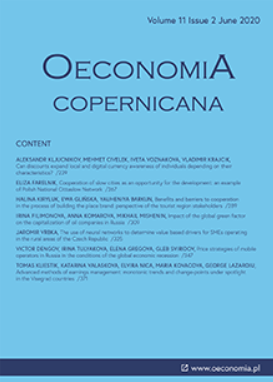Entrepreneurial orientation of SMEs’ executives in the comparative perspective for Czechia and Turkey
Entrepreneurial orientation of SMEs’ executives in the comparative perspective for Czechia and Turkey
Author(s): Aleksandr Ključnikov, Mehmet Civelek, Petr Čech, Jitka KloudováSubject(s): Gender Studies, Business Economy / Management, Behaviorism, Human Resources in Economy
Published by: Instytut Badań Gospodarczych
Keywords: entrepreneurial orientation; Czech SMEs; Turkish SMEs; age, gender and educational status of SMEs’ executives;
Summary/Abstract: Research background: The executives of SMEs that have higher innovativeness, risk taking, proactiveness, competitive aggressiveness and autonomy dynamize the strategic posture of SMEs, thus, those firms can reach better financial and economic conditions. However, existence of many differences among countries, such as cultural values and market conditions, can cause variations in EO of these executives. Therefore, this fact can be one of the reasons why the performance and financial power of SMEs differ in various countries. Purpose of the article: This study aspires to find out the differences in entrepreneurial orientation (EO) of younger and older, female and male, and more and less educated executives of SMEs from various countries. Methods: 1141 Czech and 479 Turkish executives were analyzed separately by the Mann-Whitney U test, to find out the differences in EO. The researcher ran the analyzes by SPSS Statistical Software. Findings & Value added: The results indicate that risk-taking and competitive aggressiveness of the executives differ regarding their gender, while innovativeness, proactiveness and autonomy do not. While there are significant differences between proactiveness, autonomy and innovativeness of older and younger executives, no differences exist in risk-taking and competitive aggressiveness. Regarding educational status, more educated executives perform better in innovativeness, proactiveness and autonomy, while less educated executives have higher propensities in risk taking and competitive aggressiveness. Masculinity, fear of failure, perception of obstacles, motivation of SMEs’ executives and location of businesses might be the reasons of these results. By including the survey respondents from different countries and all dimensions of EO into the analyses, this study finds similarities and differences in gender, age and education levels and of SMEs’ executives and their EO. This research also suggests some policies for governments and institutions to close the gap between EO of the executives. These facts not only make this research to unique, but also constitute a valuable addition to the literature.
Journal: Oeconomia Copernicana
- Issue Year: 10/2019
- Issue No: 4
- Page Range: 773-795
- Page Count: 23
- Language: English

